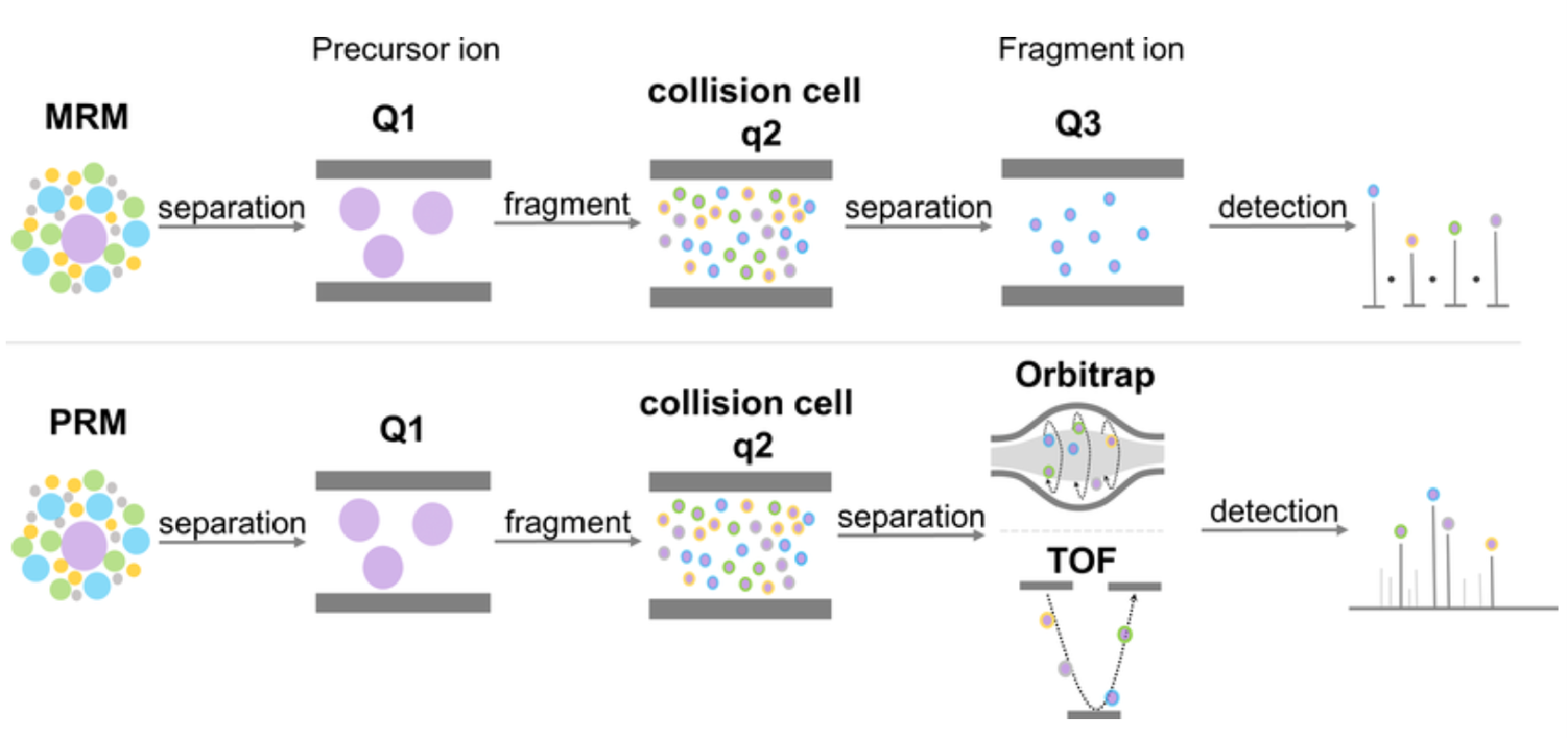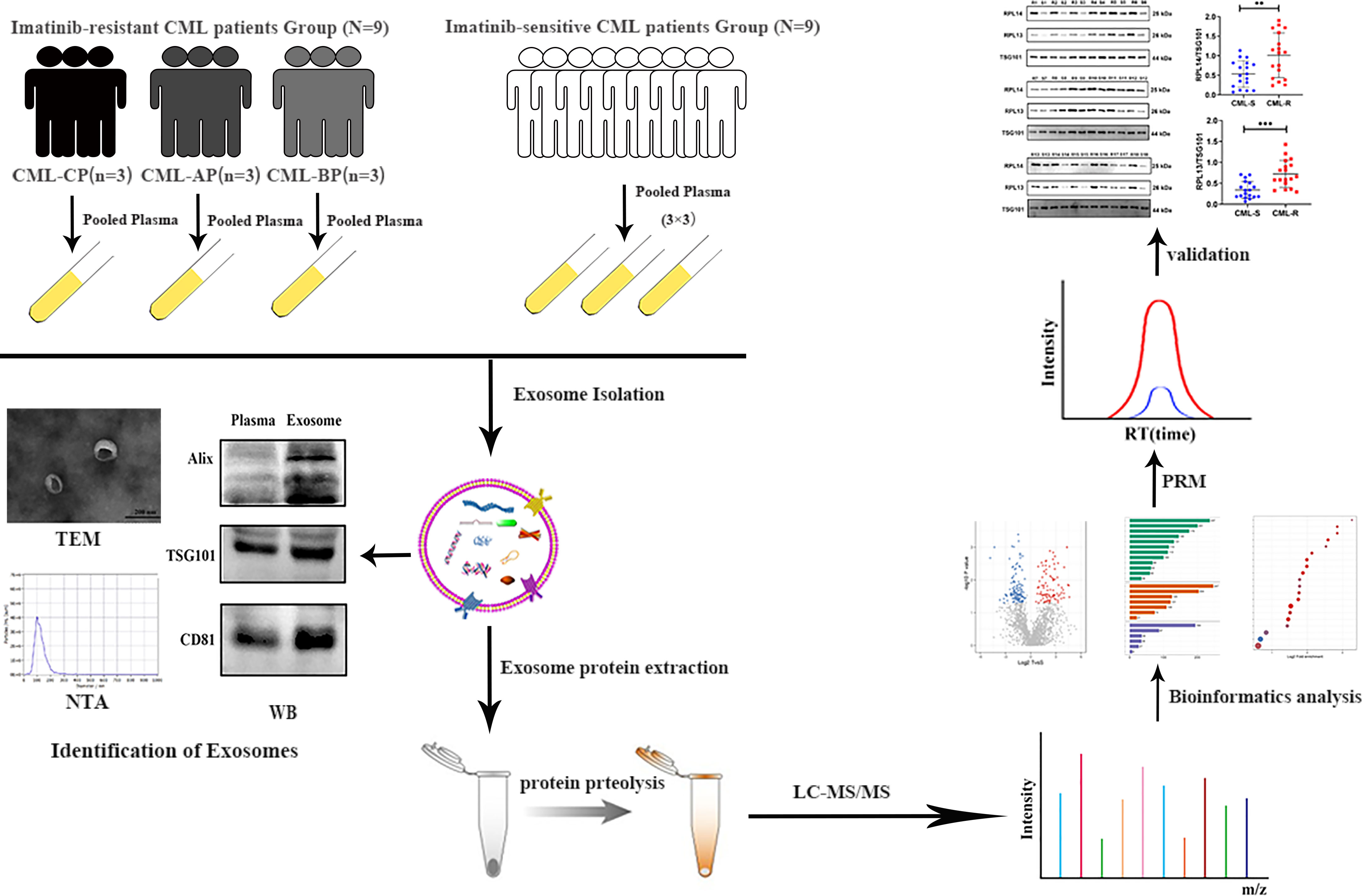MRM/PRM Targeted Exosomal Proteomic Quantitative Service
MtoZ Biolabs provides an MRM/PRM Targeted Exosomal Proteomic Quantitative Service that leverages cutting-edge mass spectrometry methods to quantify specific exosomal proteins with high accuracy and sensitivity. By providing reliable, targeted quantitation of exosomal proteins, MtoZ Biolabs aims to help researchers advance fundamental biological research, develop innovative diagnostics, and accelerate therapeutic discovery.
Exosomes are small extracellular vesicles secreted by virtually all cell types that play vital roles in intercellular communication, disease progression, and therapeutic response. By carrying proteins, lipids, and nucleic acids reflective of their parent cells, exosomes provide a unique snapshot of ongoing biological processes and can serve as valuable biomarkers for early disease detection and targeted interventions. Their stability in body fluids, coupled with the comprehensive molecular information they carry, has elevated their significance in non-invasive diagnostics and personalized medicine approaches.
MRM (Multiple Reaction Monitoring) and PRM (Parallel Reaction Monitoring) are highly sensitive and specific mass spectrometry techniques that focus on detecting and quantifying predefined target peptides. In MRM, a triple quadrupole mass spectrometer selects both the precursor ion and its fragment ions through serial quadrupole filters, allowing precise monitoring of specific transitions. PRM employs high-resolution instruments, typically Orbitrap-based or time-of-flight instruments, to acquire full fragment ion spectra of the chosen precursor, offering enhanced specificity and reliable peptide identification. By applying these targeted approaches to exosomal proteomics, our MRM/PRM Targeted Exosomal Proteomic Quantitative Service zeroes in on proteins of interest within these extracellular vesicles, precisely measuring low-abundance targets and ensuring consistent, reproducible data generation critical for biomarker validation, disease mechanism studies, and personalized medicine applications.

Figure 1. MRM and PRM Strategies for Targeted Quantification
Analysis Workflow
1. Exosome Isolation: Exosomes are isolated from biofluids or cell culture media using methods like ultracentrifugation, size-exclusion chromatography, or polymer-based precipitation. Rigorous quality checks, such as Western blotting for exosomal markers, confirm sample integrity before further analysis.
2. Protein Extraction and Digestion: Total exosomal protein is extracted and quantified, then digested with proteolytic enzymes (commonly trypsin) to generate peptides. The resulting peptide mixture is desalted and concentrated, ensuring optimal quality for LC-MS analysis.
3. HPLC Separation of Peptides: Peptides are separated on a reversed-phase column under a carefully optimized gradient. Consistent retention times maintain accurate and reproducible conditions for targeted mass spectrometric quantification.
4. Mass Spectrometry (MRM/PRM) Analysis: Using triple quadrupole (MRM) or high-resolution (PRM) instruments, target peptides are selectively monitored, delivering high sensitivity and specificity. This targeted approach quantifies even low-abundance proteins critical for biomarker research.
5. Data Processing and Quantitative Analysis: Advanced bioinformatics tools are used to normalize data, calculate relative or absolute protein quantities, and generate detailed reports on protein abundance within exosomes.
6. Reporting and Consultation: A comprehensive results package is delivered, including quantification data, methodological details, and expert interpretation. This facilitates further application in biomarker verification, disease mechanism studies, and therapeutic research.
Service Advantages
✔️High Sensitivity and Specificity: MRM/PRM offers exceptional sensitivity and specificity, enabling accurate quantification of low-abundance proteins in exosomes, even in complex biological samples.
✔️Multiplexing Capability: Simultaneously quantifies multiple target proteins in a single analysis, improving efficiency and providing comprehensive proteomic data from exosomal samples.
✔️Reproducibility: These techniques ensure reliable, reproducible results across multiple runs, ideal for large-scale or longitudinal studies in biomarker discovery and clinical research.
✔️Comprehensive Bioinformatics Analysis: Includes expert bioinformatics support, providing insights into protein networks and biological relevance from quantitative proteomics data.
✔️Tailored Service: Customizable to target specific proteins or biomarkers, ensuring the service aligns with unique research goals and requirements.
Applications
1. Biomarker Discovery and Validation
Exosomes have been widely recognized as a rich source of potential biomarkers due to their origin in parent cells and their ability to travel through bodily fluids. From oncology to neurodegenerative diseases, targeted MRM/PRM approaches allow researchers to quantitatively measure candidate biomarkers in exosomal fractions. This helps confirm their diagnostic or prognostic potential and facilitates larger-scale validation studies.
2. Disease Mechanism Studies
Understanding how cells communicate via exosomes provides crucial insights into disease mechanisms. Proteins carried by exosomes can modulate signaling pathways in recipient cells. Targeted quantification of these proteins across various disease stages can illuminate molecular changes that drive progression. For instance, in cardiovascular diseases, exosomal proteins are implicated in vascular inflammation and atherosclerosis. Precisely quantifying these proteins helps trace disease progression and identify therapeutic targets.
3. Drug Development and Therapeutic Monitoring
In pharmacology research, exosomes can be used to gauge the efficacy or toxicity of candidate drugs. Targeted proteomic workflows enable researchers to track specific protein markers that reflect cellular stress or adaptive responses to treatment. This real-time feedback accelerates drug optimization and personalizes therapy regimens. Furthermore, monitoring exosomal protein profiles over time can indicate whether a treatment is effectively modulating pathways associated with a disease.
4. Liquid Biopsy Approaches
Minimally invasive diagnostic tools are crucial in modern healthcare. Exosomes are among the top candidates for liquid biopsy development, offering more stable and reproducible insights compared to circulating free DNA or tumor cells. By applying MRM/PRM-based quantification, clinicians and researchers can monitor disease-related proteins in patient-derived exosomal samples, enabling real-time patient stratification and treatment customization.
5. Personalized Medicine
As the medical community moves toward personalized treatment, exosomal proteins can serve as unique fingerprints representing an individual’s disease state. Targeted proteomic approaches provide the sensitivity and specificity needed to detect subtle protein alterations. This allows clinicians to tailor therapeutic strategies to a patient’s molecular profile, improving efficacy and reducing adverse effects.
Case Study
Exosomal Proteomics for Imatinib Resistance in CML
Researchers investigated why some chronic myeloid leukemia (CML) patients develop resistance to the tyrosine kinase inhibitor Imatinib. They isolated plasma exosomes from 9 imatinib-resistant and 9 imatinib-sensitive CML patients, then performed label-free LC-MS/MS to screen protein differences. Out of 2812 identified proteins, 279 showed significant expression changes, hinting at altered protein synthesis and lipid metabolism pathways in resistant patients. To validate these findings, they employed PRM to quantify key ribosomal proteins (RPL13 and RPL14), confirming their substantial upregulation in resistant samples. This underscores the potential of targeted exosomal proteomics—specifically MRM/PRM approaches—in pinpointing biomarkers like RPL13 and RPL14, offering a promising route for early detection and personalized treatment strategies against imatinib resistance.

Figure 2. Schematic Workflow Shown the LC-MS/MS-based Quantitative Proteomic Analysis of Exosome Isolated from Plasma Samples of IM-R and IM-S CML Patients
FAQ
Q1: What types of exosome samples can be analyzed with MRM/PRM Targeted Exosomal Proteomic Quantitative Service?
This service can analyze exosomes isolated from a variety of biofluids, including serum, plasma, urine, saliva, and cerebrospinal fluid (CSF), as well as exosomes from cell culture supernatants.
Q2: What are the advantages of using MRM/PRM for exosomal proteomics?
They offer high specificity, sensitivity, and reproducibility for quantifying low-abundance proteins, allowing targeted, multiplexed measurements with minimal interference from complex exosomal backgrounds.
MtoZ Biolabs, an integrated Chromatography and Mass Spectrometry (MS) Services Provider, provides advanced proteomics, metabolomics, and biopharmaceutical analysis services to researchers in biochemistry, biotechnology, and biopharmaceutical fields. Our MRM/PRM Targeted Exosomal Proteomic Quantitative Service is designed to provide more rapid, high-throughput, and cost-effective analysis, with exceptional data quality and minimal sample consumption. Free project evaluation, welcome to learn more details.
How to order?







